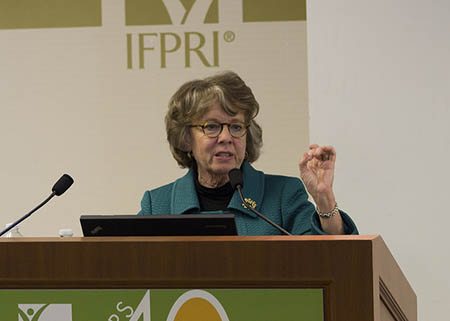Many challenges to economic growth—from poor nutrition to low farm yields—require not only tools and interventions, but individual behavior change. Unfortunately, there is often a disconnect between what is needed to change behaviors and where we are investing public resources to address a given problem. By promoting single, simple, doable behaviors, social marketers can help bring about tangible results over time, and replace unproductive behaviors with positive ones.
Earlier this week, IFPRI hosted social marketing expert Nancy Lee to highlight applications of social marketing principles to enact positive change across various sectors, including public health and nutrition, family planning, and the environment. Social marketing, which Lee defined as “a process that uses marketing principles and techniques to influence a target audience behavior that will benefit society, as well as the individual,” can play a key role in addressing many of the most pressing issues societies and individuals face. According to Lee, social marketing can be the hardest type of marketing to implement, but it can have profound impacts when done right.
She highlighted twelve principles for success when implementing social marketing campaigns, offering real life examples to illustrate how they work — from anti-smoking campaigns to vote-by-mail laws to family planning initiatives. One such example involving nutrition was the Lucky Iron Fish campaign in Cambodia. Researchers estimate that almost half of the country’s population is iron deficient due to insufficient dietary intake. In this case, the solution to the problem at hand was readily available: cooking with an iron brick in one’s pot can provide an entire family with up to 75 percent of their daily iron intake for up to 5 years. But families weren’t cooking with these bricks. Through conversations with women and mothers—the target audience—researchers were able to understand the barriers to the desired behavior change and formulate a strategy to overcome them. Ultimately, the iron bricks were reshaped as small fish, which were viewed as good luck omens by the target audience. The women began cooking with the fish-shaped iron bricks, and the researchers saw clinical iron deficiency anemia drop by half–and iron levels increase–among those who adopted the new behavior.
Success stories such as this illustrate the potential of social marketing to help achieve development goals, particularly improving health and nutritional outcomes. Now IFPRI and other development organizations are tasked with figuring out how to apply social marketing principles to our own work. According to Lee, regardless of the desired behavior change, it all begins with a better understanding of the target audience. What are the barriers that prevent them from changing existing behaviors? What are the potential benefits they recognize in changing the behavior? What would motivate them to make the change? Answering these questions for our ultimate target beneficiaries, poor and hungry people, will go a long way toward effecting positive, lasting behavior change. Ultimately it will help IFPRI reach its mission of sustainably reducing poverty and ending hunger and malnutrition.







